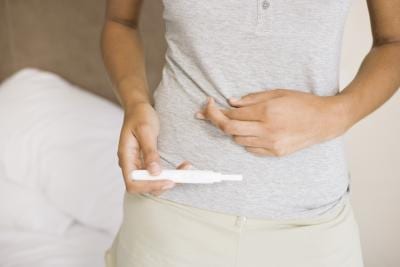It isn’t uncommon for women to experience variations in their periods, but if irregular menstrual cycles persist over several months, you probably have irregular periods. Long menstrual cycles can cause a woman difficulties when it comes to getting pregnant. Irregular periods may mean that you are ovulating less often, reducing your chances of pregnancy.
The Menstrual Cycle
Every woman is different when it comes to the menstrual cycle. Most women’s menstrual cycles occur every four weeks, usually between 24 and 35 days. To measure the length of your own menstrual cycle, begin counting from the first day of your last period. Stop counting on the first day of the following month’s period.
Problems With Ovulation
Women who have irregular periods can have trouble getting pregnant. Irregular menstruation may not be as much of a problem as how often you ovulate. A woman needs to ovulate and release an egg to have a chance at conceiving. Your doctor may prescribe a fertility drug to trigger ovulation.
Estimating Ovulation
If you are trying to get pregnant, you need to have some idea about when you are the most fertile. Knowing the time of ovulation is easier for women who have a consistent 28-day cycle. Ovulation usually begins about 14 days after your last period began. Counting isn’t always an accurate method, especially if you have irregular cycles. Women who have irregular periods and longer cycles should subtract 18 from the number of days in their shortest cycle. You can try to estimate your most fertile days by counting ahead that many days when your next menstrual period begins. Engage in sexual intercourse once each day during the days leading up to ovulation. This may increase your chances for getting pregnant.
Causes of Anovulation
Diabetes, thyroid, pituitary or adrenal dysfunction, liver disease and problems with the ovaries are conditions that can interfere with normal ovulation. Anovulation is the term used when a woman fails to ovulate during her menstrual cycle. A hormonal imbalance known as polycystic ovary syndrome can cause irregular periods and irregular ovulation. This is a common problem that affects about 5 to 10 percent of women of childbearing age. Because PCOS is often associated with obesity, losing weight can increase a woman’s chances of conceiving.
What to Do About Irregular Periods
If you are experiencing irregular periods and want to get pregnant, see your doctor for a complete physical examination. Your doctor will perform a pelvic exam and may order an ultrasound. Many times finding ways to relieve stress, eating nutritiously and getting regular exercise can restore more regular menstrual cycles. Other healthy lifestyle changes include not smoking, avoiding caffeine and consuming less alcohol. Each factor can contribute to a woman having irregular periods.
Getting Pregnant
Once your doctor rules out there are no medical conditions causing your ovulation problems, he may prescribe fertility drugs. Stress and illness are other factors that can contribute to irregular ovulation. Treatments that can increase the chances of getting pregnant are available for women who have PCOS. Drugs to stimulate ovulation can help restore regular periods and ovulation.





